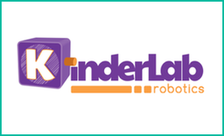
In addition, it providing opportunities for integrating these topics with arts and literacy activities. With this newest addition, KinderLab now offers more than 150 hours of standards-aligned robotics curriculum across its various books.
Growing with KIBO is built upon the work of Dr. Marina Bers and her DevTech Research Group at Tufts University. The new guide expands upon the research-backed progression established in KinderLab’s Creating with KIBO curriculum, adding many more classroom hours of lesson plans and establishing a clear, progressive scope and sequence built on three themes: powerful ideas in computational thinking, the engineering design process, and social-emotional learning (SEL). Each of these themes is grounded in Dr. Bers’ extensive research and her published pedagogical frameworks around creative and positive technology education for early childhood.
Jason Innes, the Manager of Training and Curriculum Development at KinderLab Robotics, Inc., said, “We are so excited about bringing this new, research-supported guide to educators working with young children. All of KIBO’s curriculum is based on Dr. Bers’ extensive research, with a proven scope and sequence for coding and robotics in early childhood. InGrowing with KIBO, we wanted to make these concepts even easier for teachers to implement in the classroom. With 60 hours of sequenced lesson plans, this new guide can become the basis for three years of coding, engineering, and robotics curriculum based on Dr. Bers’ philosophy of creative technology education and positive social development.”
KinderLab developed the curriculum in collaboration with educators using KIBO in the early-learning classroom. Angie Kalthoff, Technology Integrationist in St. Cloud Area School District 742, MN, added, “When working with KIBO, kids are learning coding and engineering through hands-on experience. Growing with KIBO supports teachers in creating this hands-on environment. Instead of telling students directly what to do, you are encouraged to allow them to try and ask questions that start with ‘Have you noticed…’ and ‘What happens when...’? In my favorite activity, the Hokey Pokey, students get up and dance with their robots. They program KIBO to dance one part of the dance at a time, developing their critical thinking as they match their dance actions to KIBO's programming blocks. They are learning sequencing and programming through movement and creative expression.”
Growing with KIBO - A Progressive Robotics Curriculum for Grades K-2 is available for pre-order from the KinderLab Webstore for a special introductory price of $50. The promotion expires on February 28, 2019, which is also when the guide will be available to ship.
FETC 2019 attendees are welcome to stop by booth #2214 to learn more about KIBO and Growing with KIBO - A Progressive Robotics Curriculum for Grades K–2.
About KIBO – The Playful STEAM Robot
KIBO is a robot kit that allows children aged 4–7 to build, program, decorate, and bring their own robot to life without requiring any screen time on a smartphone, tablet, or computer. It is an open platform on which students can envision and create their own robot. With art and engineering, students transform KIBO into imagined animals, vehicles, storybook characters, and more. Students plan a coding sequence using wooden programming blocks, then scan their sequence with the built-in barcode scanner, press its button—and the robot comes alive. KIBO is a Winner in the Technology/Preschool category in the 2018 Seriously STEM awards as well as numerous other awards.
When children build, code, and decorate their own robot, they perceive it as play, but they are learning invaluable STEAM skills. Not only are these hands-on experiences inherently rewarding, but they help children understand the technology in their world and can even improve their future job prospects.
About KinderLab Robotics, Inc.
KinderLab Robotics is the creator of KIBO, a playful educational robot kit based on 20 years of child development research with thousands of children, teachers, and parents. Developed specifically for teachers by Dr. Marina Umaschi Bers at Tufts University, KIBO is currently used in 54 countries and has proven efficacy in helping kids learn STEAM—and getting them excited about it! KinderLab offers a complete suite of teaching materials that help integrate STEAM elements into a wide range of curricula, including art, cultural studies, and reading literacy.












